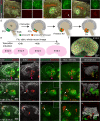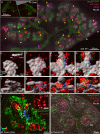Nephron progenitor commitment is a stochastic process influenced by cell migration
- PMID: 30676318
- PMCID: PMC6363379
- DOI: 10.7554/eLife.41156
Nephron progenitor commitment is a stochastic process influenced by cell migration
Abstract
Progenitor self-renewal and differentiation is often regulated by spatially restricted cues within a tissue microenvironment. Here, we examine how progenitor cell migration impacts regionally induced commitment within the nephrogenic niche in mice. We identify a subset of cells that express Wnt4, an early marker of nephron commitment, but migrate back into the progenitor population where they accumulate over time. Single cell RNA-seq and computational modelling of returning cells reveals that nephron progenitors can traverse the transcriptional hierarchy between self-renewal and commitment in either direction. This plasticity may enable robust regulation of nephrogenesis as niches remodel and grow during organogenesis.
Keywords: Wnt4; cell migration; developmental biology; kidney development; mouse; nephron progenitor; regenerative medicine; single cell transcriptional profiling; stem cells; stochastic induction.
© 2019, Lawlor et al.
Conflict of interest statement
KL, LZ, JL, JP, NH, AO, AC No competing interests declared, ML Has consulted for and received research funding from Organovo Inc
Figures
















Comment in
-
Some nephron progenitors fail to commit.Nat Rev Nephrol. 2019 Apr;15(4):192. doi: 10.1038/s41581-019-0122-y. Nat Rev Nephrol. 2019. PMID: 30737496 No abstract available.
Similar articles
-
Wnt11 directs nephron progenitor polarity and motile behavior ultimately determining nephron endowment.Elife. 2018 Dec 5;7:e40392. doi: 10.7554/eLife.40392. Elife. 2018. PMID: 30516471 Free PMC article.
-
p53 Enables metabolic fitness and self-renewal of nephron progenitor cells.Development. 2015 Apr 1;142(7):1228-41. doi: 10.1242/dev.111617. Development. 2015. PMID: 25804735 Free PMC article.
-
Dynamic MAPK/ERK Activity Sustains Nephron Progenitors through Niche Regulation and Primes Precursors for Differentiation.Stem Cell Reports. 2018 Oct 9;11(4):912-928. doi: 10.1016/j.stemcr.2018.08.012. Epub 2018 Sep 13. Stem Cell Reports. 2018. PMID: 30220628 Free PMC article.
-
Nephron progenitor cell commitment: Striking the right balance.Semin Cell Dev Biol. 2019 Jul;91:94-103. doi: 10.1016/j.semcdb.2018.07.017. Epub 2018 Jul 30. Semin Cell Dev Biol. 2019. PMID: 30030141 Review.
-
Epigenetic States of nephron progenitors and epithelial differentiation.J Cell Biochem. 2015 Jun;116(6):893-902. doi: 10.1002/jcb.25048. J Cell Biochem. 2015. PMID: 25560433 Free PMC article. Review.
Cited by
-
Kidney organoids: accurate models or fortunate accidents.Genes Dev. 2019 Oct 1;33(19-20):1319-1345. doi: 10.1101/gad.329573.119. Genes Dev. 2019. PMID: 31575677 Free PMC article. Review.
-
Mapping the human kidney using single-cell genomics.Nat Rev Nephrol. 2022 Jun;18(6):347-360. doi: 10.1038/s41581-022-00553-4. Epub 2022 Mar 17. Nat Rev Nephrol. 2022. PMID: 35301441 Review.
-
β-catenin regulates the formation of multiple nephron segments in the mouse kidney.Sci Rep. 2019 Nov 4;9(1):15915. doi: 10.1038/s41598-019-52255-w. Sci Rep. 2019. PMID: 31685872 Free PMC article.
-
Smarca4 deficiency induces Pttg1 oncogene upregulation and hyperproliferation of tubular and interstitial cells during kidney development.Front Cell Dev Biol. 2023 Sep 4;11:1233317. doi: 10.3389/fcell.2023.1233317. eCollection 2023. Front Cell Dev Biol. 2023. PMID: 37727504 Free PMC article.
-
Comparative whole-genome transcriptome analysis in renal cell populations reveals high tissue specificity of MAPK/ERK targets in embryonic kidney.BMC Biol. 2022 May 13;20(1):112. doi: 10.1186/s12915-022-01309-z. BMC Biol. 2022. PMID: 35550069 Free PMC article.
References
-
- Barak H, Huh SH, Chen S, Jeanpierre C, Martinovic J, Parisot M, Bole-Feysot C, Nitschké P, Salomon R, Antignac C, Ornitz DM, Kopan R. FGF9 and FGF20 maintain the stemness of nephron progenitors in mice and man. Developmental Cell. 2012;22:1191–1207. doi: 10.1016/j.devcel.2012.04.018. - DOI - PMC - PubMed
Publication types
MeSH terms
Substances
Grants and funding
- DE150100652/Australian Research Council/International
- GNT1136085/National Health and Medical Research Council/International
- GNT1156567/National Health and Medical Research Council/International
- R01 DK100315/DK/NIDDK NIH HHS/United States
- GNT1063989/National Health and Medical Research Council/International
LinkOut - more resources
Full Text Sources
Other Literature Sources
Medical
Molecular Biology Databases

